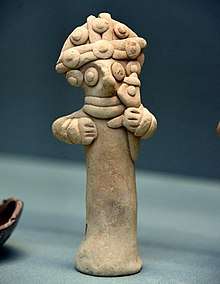Euphrates Syrian Pillar Figurines
The Euphrates Syrian Pillar Figurines (EU SPF's) are anthropomorphic clay figurines dating from the late Iron Age period (mid 8th-7th centuries BCE) and produced in the Middle Euphrates region. These figurines are part of a greater coroplastic production mainly composed of handmade horse-rider figurines, i.e. the Euphrates Handmade Syrian Horses and Riders (EU_HSHR's).

EU_SPF holding a child from Karkemish. The British Museum, London, no. 108757.
Other names in literature
The actual nomenclature adopted for this class of figurines has been recently proposed in a doctoral research.[1] Their current name recalls both their geographic origin and the shape of their bodies, which are hollow, tubular, and sometimes twice grooved at the base. However, one may find their appearance in literature with different nomenclatures:
Museums collections
| Museum | Provenience | Nos. of figurines | Museum Nos. |
|---|---|---|---|
| British Museum, London | Karkemish, Yunus, Middle Euphrates cemeteries | 20 | 104476, 105041, 105042, 105043,105044, 105045, 105050, 105051, 105052, 105053, 105054, 105055, 105057, 105098, 108757, 116182, 116326, 138204, 138205, H80.21 |
| Ashmolean Museum, Oxford | Karkemish, Deve Höyük, Kefrik, Middle Euphrates cemeteries | 9 | AN1913.447, AN1913.634, AN1914.795, AN1914.796, AN1915.239.36, AN1935.29, AN1935.31, AN1947.341, AN49.47.328 |
| Fitzwilliam Museum, Cambridge | Deve Höyük | 1 | ANE.80.1913 |
| Museum of the Ancient Near East, Berlin | Deve Höyük | 1 | VA 07080 |
| Museum of Anatolian Civilizations, Ankara | Karkemish | 2 | 1568,201A, 1569,201A[5] |
| Istanbul Archaeology Museums, Istanbul | Karkemish | 2 | 5383, 5384 |
| Bible Lands Museum, Jerusalem | North Syria | 2 | 0594,[6] 0598[7] |
| Israeli National Maritime Museum, Haifa | Unknown | 1 | 3825[8] |
| Israel Antiquities Authority, Beith Shemesh | Tel Zeror | 1 | IAA1966-354[9] |
Notes
- Bolognani, B. 2017, pp. 45,139.
- Moorey, P.R.S. 1980, pp.100–101; 2005, pp.220–222.
- Pruss, A. 2010, pp. 216–225.
- Clayton, V. 2001, Part II: The Figurines; 2013, pp.17–24.
- Bolognani, B. 2017, cat.nos.797–798
- Schlossmann, B.L. 1981, p.261, no.224; Spicket, A. 2000, p.130, no.143.
- Schlossmann, B.L. 1981, pp.222–223, no.183.
- Zemer, A. 2009, p.75, fig.27.
- Ohata, K. 1967, pl. XLVII, no.4.
gollark: "Typeclasses are TOO COMPLICATED so let's bodge something similar in in an ad-hoc way (`comparable`) while c ausing many problems"
gollark: Coupled with the type system, this is why I dislike Elm.
gollark: Yes, I know.
gollark: Fortunately, you can take the good parts without... them.
gollark: Yep!
References
- Bolognani, B. 2017, The Iron Age Figurines from Karkemish (2011–2015 Campaigns) and the Coroplastic Art of the Syro-Anatolian Region, unpublished doctoral dissertation, University of Bologna, Bologna. amsdottorato.unibo.it/8222/7/Bolognani_Barbara_tesi.pdf
- Bolognani, B. 2020, “The Iron Age Female Figurines from Karkemish and the Middle Euphrates Valley. Preliminary Notes on Some Syrian Pillar Figurines”, in Donnat S., Hunziker-Rodewald R., Weygand I. (eds), Figurines féminines nues : Proche-Orient, Égypte, Nubie, Méditerranée, Asie centrale (VIIIe millénaire av. J.-C. - IVe siècle ap. J.-C.), Proceedings of the International Conference “Figurines féminines nues. Proche-Orient, Egypte, Nubie, Méditerranée, Asie centrale”, June 25th-26th 2015, MISHA, Strasbourg (EAHA), De Boccard, Paris, pp. 209-223.
- Clayton, V. 2001. Visible Bodies, Resistant Slaves: Towards an Archaeology of the Other: The 7th Century Figurines from Tell Ahmar, unpublished doctoral dissertation, University of Melbourne, School of Fine Arts, Classical Studies and Archaeology, Melbourne.
- Clayton, V. 2013. Figurines, Slaves and Soldiers. The Iron Age Figurines from the Euphrates Valley, North Syria, K&H Publishing, Victoria.
- Moorey P.R.S. 1980, Cemeteries of the First Millenium B.C. at Deve Huyuk, near Carchemish. Salvaged by T.E. Lawrence and C.L. Woolley in 1913 (with a catalogue raisonne of the objects in Berlin, Cambridge, Liverpool, London and Oxford)(«BAR» 87), Bar Publishing, Oxford.
- Moorey P.R.S. 2005, Ancient Near Eastern Terracottas: With a Catalogue of the Collection in the Ashmolean Museum, Ashmolean Museum, Oxford.
- Ohata, K. (ed.) 1967. Tel Zeror II. Preliminary Report of the Excavation, Second Season 1965, The Society for Near Eastern Studies in Japan, Tokyo.
- Pruss A. 2010, Die Amuq-Terrakotten. Untersuchungen zu den Terrakotta-Figuren des 2. und 1. Jahrtausends v.Chr. aus dem Grabungen des Oriental Institute Chicago in der Amuq-Ebene,(Subartu 26), Brepols, Turnhout.
- Schlossman, B.L. 1981, "183. Female Figurine", "224. Female Figurine", in O.W. Muscarella (ed.), Ladders to Heaven : Art Treasures from Lands of the Bible : a Catalogue of some of the Objects in the Collection Presented by Elie Borowski to the Lands of the Bible Archaeology Foundation and Displayed in the exhibition "Ladders to Heaven : Our Judeo-Christian Heritage 5000 BC-AD 500", Royal Ontario Museum, June 23 – October 28, 1979, The Bible Lands Museum, Jerusalem, pp. 222–223,261.
- Spycket, A. 2000, The Human Form Divine: From the Collections of Elie Borowski, Bible Lands Museum, Jerusalem.
- Zemer, A. 2009, Terracotta Figurines in Ancient Time, The National Maritime Museum, Haifa Museums, Haifa.
This article is issued from Wikipedia. The text is licensed under Creative Commons - Attribution - Sharealike. Additional terms may apply for the media files.